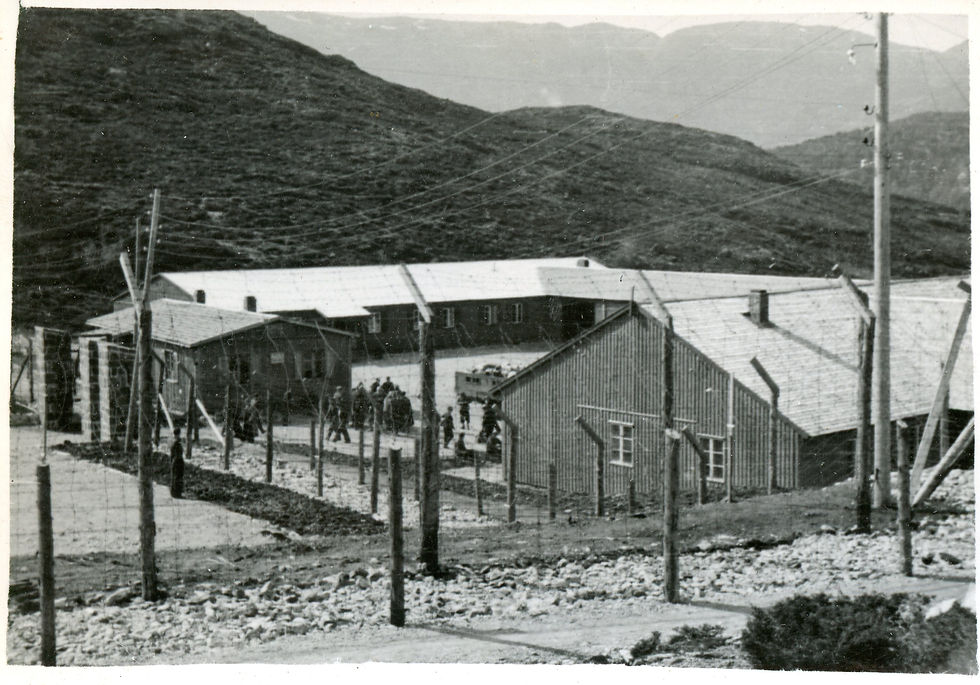A Pedacito Of My Family And The Occupation Of Norway During WWII
- Alex Gerlach
- Nov 29, 2021
- 4 min read
Updated: Jun 19, 2022
Every family has a story. Rather, it's many stories and experiences that become the roadmap of every moment up until, well, you. Today, I want to tell a special story, one I’ve heard bits and pieces of all my life. One that fascinated me as a child and still does to this day. This is the story of my family and their experiences under Nazi occupation.

I never know where to start the timeline of my family’s history. Like a checkerboard, there are too many moving pieces, stories, and experiences to sometimes keep track of. But I’m going to start with my great-grandparents: Super Nanny and Papa Nordeide.
Super Nanny (Ellen Blanche Nordeide) and Papa Nordeide (Albert Johan Nordeide) met, in a way, by chance. Originally from separate countries, I can’t imagine what the odds were that they ended up in New York at the same time. Super Nanny was from Newfoundland and Papa Nordeide hailed from Norway.

When they met, Super Nanny was visiting family in New Jersey. At the same time, my great-grandfather, a sailor, was docked in New York. Through some grapevine of friends and family, they were introduced to each other.
I'm not sure what sparked the connection that began in that first meeting, or how long they courted, but it must have been enough. Months later, after Super Nanny had returned to her home in Newfoundland, Papa Nordeide followed and proposed.
Due to his poor English, he ended up writing “will you marry me” on a pack of Lucky Strike cigarettes as his proposal.
I started hearing whispers of my family’s experience in WWII when I was an adolescent. My grandmother would share bits and pieces and show photos. My mom mentioned listening to Super Nanny talk about the sounds of bombs and planes roaring over Bergen.
Then, when I visited Norway for the first time, I heard about the experience first-hand from those who were there. But understanding the story and experiences of my family under Nazi occupation requires a bit of background history.

When Germany invaded Norway, it was for a number of reasons. The main reason is that the Germans needed access to naval ports and the U-Boat base located in Bergen to bolster their control of the Atlantic. This would give them access to Norway’s submarines and the perfect opportunity to start infiltrating England.
Norway’s occupation was also necessary for access to heavy water, a key ingredient for
building atomic bombs. During Norway’s occupation, Germany took control of their hydroelectric plants to get access to this chemical compound.
Luckily, the effort was thwarted by Allied Forces and Norwegian commandos destroyed the plants and removed heavy water.
I highly suggest checking out this short show series to learn more.
During World War II, Germany established about 110 prison camps across Norway, primarily for Russian prisoners of war. The remains of a detention camp in Bergen used to house political prisoners, Russians, and (according to my grandmother) Jews, as well.

Photo courtesy of Leon Jacobsen, Statsarkivet i Bergen
While visiting my family in 2016, my Tante Mary told me about the Russians who were building bunkers down the road from their home. Every day, she and her sisters would bring them bits of food, like bread, while they worked.
The craziest thing about those bunkers down the road was that they were built using the bricks from my family’s home. At the time, Tante Mary’s husband was building an addition for their house, but the Nazis came and took the materials for their own use. To this day, those bunkers, made from my family’s bricks, are still there.

My family members played multiple roles during the war. While Tante Mary and the other sisters were working as nurses and feeding prisoners of war, Papa Nordeide and his brother were part of the resistance. By hiding radios in the unused water heater pipes of their factory, they were able to get information from outside of the country.
There are so many other pieces of the story I’ve heard over the years. Super Nanny saw the terrifying twin experimenter, Josef Mengele, in Bergen. My great-great-grandfather was pushed out of a window by Nazis and broke his kneecaps.
Or, the death of baby Elisabeth, my grandmother’s older sister, who died shortly after her birth and whose resting place is unknown.
After the war ended, my grandmother was born and lived in Bergen for the first 6 years of her life. In an effort to be closer to family in the states, Super Nanny, Papa Nordeide, and my grandmother immigrated to New Jersey.
The stories our families pass down have power because they can transport and connect us to times, or experiences, long gone. When visiting my grandmother to gather information and photos for this piece, I felt the same wonder and fascination as she repeated these tales to me.
This story doesn’t end here and there is still so much to tell. There's the mysterious photo of a priest's grave in Papa Nordeide’s wallet. Or, the adventures of Aunt Ag, a female pilot and sergeant in the U.S. military during WWII. Unfortunately, these are stories for another day or, perhaps, a part two.
Join our community to network with other travelers around the world and to gain access to exclusive content and events. Submit your travel stories for a chance to get published!























Comments